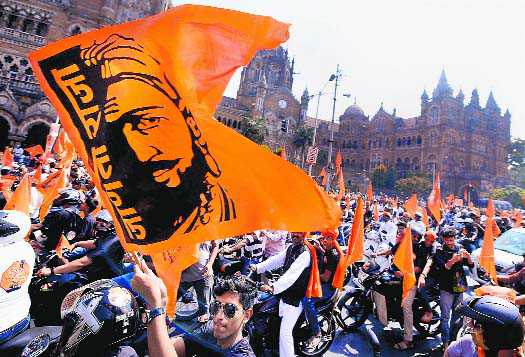Protests by members of Maharashtra’s powerful Maratha community have left people of the state as well as in other parts of the country completely stunned. Here’s a community which has dominated Maharashtra since its formation six decades ago. Politicians across the spectrum come from this community. The state’s thriving co-operative sector comprising sugar and banking are controlled by the Marathas. Leaders of the community have made the most from the privatization of education with several
The Marathas who account for 34% leading lights controlling medicine and engineering colleges of Maharashtra’s population have a virtual stranglehold on the state’s rural economy with Dalits and Other Backward Castes often getting the rough end of their stick.
So what has provoked the Marathas to hit the streets in what they call “silent protests”? A large number of protesters, mainly youth but also comprising white-collared workers and small businessmen, hold rallies in orderly fashion at the end of which girls as young as 12 or 13 read out their charter of demands.
The demands remain uniform: reservation in education institutions and government jobs, abolition of the Scheduled Castes and Tribes (Prevention of Atrocities Act) and imposition of the death penalty for the Dalit youths accused in the rape and murder of a 13-year old Maratha girl in Kopardi, Satara district, earlier this year. Though the protests were ostensibly sparked by the rape-murder, the community has been seething since the release of a Marathi film, Sairaat, earlier this year. The movie, a doomed love story of a Maratha girl and a boy from a fishing community, ends in an honour killing. There were protests by Dalits and OBCs. The Marathas saw red. “The film portrays the Marathas in bad light,” said Rajendra Kondhre, president Akhil Bhartiya Maratha Mahasangh. The Kopardi rape-murder happened shortly after the film’s release. The Mahasangh and others sought to draw a link between the two.
Many say Maratha leaders across political lines also worked behind the scenes to list a number of grievances.
The protests have seen participation of prominent Maratha leaders who shed their political affiliations. Narayan Rane of the Congress and Ajit Pawar of the NCP were among those who quietly marched with the youth of the community.
“The youth of our community are hurt because they are not eligible for reservations. It takes at least Rs 12 lakh to study in a private medical college while those enjoying reservations can enrol in government-run institutions that charge a lot less,” says Pravin Gaikwad, president, Maratha Seva Sangh. The community is demanding a 16% quota in education institutions and government jobs. Other communities in Maharashtra, however, do not really agree with the Marathas. Leaders of the Dalits and Other Backward Castes have also mobilized their followers to ensure that the Marathas do not muscle their way into the existing quota system. “We do not want the Marathas to be classified as OBCs as they would cut into our share of quotas,” says Anil Mahajan, president of Maharashtra Mali Mahasangh which represents the Mali OBC community.
State Minister for Women and Children’s Welfare Pankaja Munde, who spoke at a rally of her community, the Vanjaris, said she would not oppose quotas for Marathas as long as they did not disturb the existing setup.
This would be a tall order since 48% of government jobs and 49% of seats in education institutions are already reserved under various quotas. Former Chief Minister Prithviraj Chavan’s attempts to bring in the Marathas and Muslims under the quota framework just before the 2014 state assembly polls were struck down by the courts since it would violate SC orders to limit all quotas up to 50%. The ruling BJP smells conspiracy. “It is for the first time in decades that Maharashtra does not have a Chief Minister from the Maratha community. Maratha leaders cannot digest the fact that a Brahmin has become the chief minister,” says a BJP leader in Mumbai.
Unlock Exclusive Insights with The Tribune Premium
Take your experience further with Premium access.
Thought-provoking Opinions, Expert Analysis, In-depth Insights and other Member Only Benefits
Already a Member? Sign In Now










